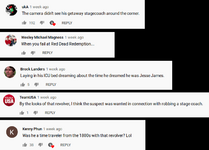- Messages
- 212
- Reactions
- 538
the gun pictured was a cartridge conversion--not a frontloader
Follow along with the video below to see how to install our site as a web app on your home screen.
Note: This feature may not be available in some browsers.
I have lots of concerns friend.
The point I'm am trying to make is that people are going to demand this kind of video justification in the future, which I do think is good for everyone. It leaves nothing to the imagination. I have no problem with that part. I have no idea what you do for a living, but if the public demanded that my company start putting out videos to justify our actions, we wouldn't have enough time or manpower to complete our other responsibilities. My guess is that researching the footage, putting it together in a cohesive timeline, adding in specific captions to explain what's going on and then making a production out of it takes time and people. The recent calls to defund the police is potentially going to force police departments to operate with less money and less people. If this is going to become a required part of justifying police actions then it might come at the expense of another program. All I'm saying.
I'm also concerned that when this same exact scenario occurs with badge cam video being inconclusive and no other CCTV footage available, what happens then? I hope the public will understand, but I fear it will then become a "cop conspiracy", that they didn't provide footage because the incident was not justifiable. I just see lots of worms coming out of this can.
There's an inherent trust in the police that underlies your post and it's this aspect to which I disagree. Cops are human - not without flaws nor infallible. Yet, their position grants them the state's monopoly on violence as one of many powers and they enjoy the privilege of qualified immunity as well. In some hypothetical world where all cops are saints, this is a non-issue. Given that police have such power, how would you weed out corruption? How would you find abuses of power?
Fact is, we don't have a system to balance out the powers granted to police. Forcing the recording of video for their interactions with the public is a good first step in balancing their powers with the public's. I think you're overestimating the time cost to this idea. Many a fully automatic system have already been built to do this type of work; it's not some guy in a broom closet having to work on a 10 year old computer with some outdated version of Final Cut.
We're turning the corner from believing that cops are vetted to be righteous executors of the law whose word is gold to realizing that cops are people too and maybe we shouldn't hold their word over another's. Best thing that can happen, for everyone, is the recording of interactions with the public, especially if a shooting occurs. You're always going to have the conspiracy folks - that's not the point. The point is to provide a jury with the best evidence with which to reach a verdict. If that means a shaky bodycam video, then so be it - it's better than verbal testimony alone. Not only that, but as we get more used to this the tools and systems will get better. I think there are far fewer worms in the can.
So, a cop shoots at someone and your concern is the work load?
This appears to be a perfectly justifiable use of force, and we wouldn't know that without the video. This evidence is the best defense a cop could have for why they used deadly force.
This thread provides a textbook example of a rational and respectful discussion on an important and potentially controversial topic. It says an awful lot about the caliber of people who posted.

"He wasn't perfect but (he) strived to make everybody happy as best he could," Huerta said. "He was selfless and would've gave the shirt off his back to anybody in need regardless of knowing them or not. He was loyal and smiled through good or bad situations in his life."
This gets brought up a LOT by many who "think" that because they can buy these by mail they are not a firearm. The problem for many who think that is almost all if not all states classify them as a firearm. Lost track of the times someone on line would say they could carry these and laws would not matter. Assuming he could not own a gun, which I suspect he could not, and he had not been shot, he would still be charged with possession of that thing.The article called the blackpowder pistol a gun, last I knew, federal laws say they are not.
O well, 1 for the copper and 0 for MS-13.
